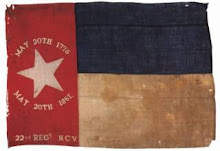- I want to first apologize for the delay in posting for the past few weeks. Between writing, working, and researching I have just not had as much time as I would like, but I hope to be back posting regularly for the foreseeable future.
- Quick update on the book I am about two months away from having it finished, then comes the edit and revision process, and finally laying it out to publish. Once I have a clear date on when I will have copies I will let everyone know.
In a copy of a speech from March 13, 1906 by Carry Augusta Leazar, given to the Battle of Bentonville Chapter of the United Daughters of the Confederacy in Morrisville, North Carolina, outlining the service of her father Lieutenant Augustus Leazar there was an interesting description of the aftermath of the Battle of Newport Barracks. Augustus Leazar, from Rowan County, enlisted in the Company G of the 42nd North Carolina on March, 15, 1862 at the age of nineteen and on the same day was given a commision as a first lieutenant in the regiment. At the time of the battle Leazar was twenty years old.
In her speech Carry Leazar, who at the time was the historian of the North Carolina Division of the United Daughters of the Confederacy, states that Lieutenant Leazar was able to capture a sack of coffee, which he sent to his mother in Rowan County who was roasting rye and chipped sweet potatoes as a substitute for regular coffee. But a more interesting piece of information comes from another item that Leazar captured from the Union camp at Newport, Carry Leazar writes:
Another trophy of this field is a volume of Blackstone now in our library, inscribed with the name of "John M. Laughlin, 1st Lieut. Co. A., 103 Penna. Regiment, Penna. Vols."
The volume was most likely a copy of Sir William Blackstone's Commentaries on the Laws of England.
The original owner John M. Laughlin was a member of the 103rd Pennsylvania Volunteer Infantry. Laughlin enlisted on May 1, 1862 and, like Leazar, was promoted to lieutenant. We are able to have a general idea when Laughlin might have first come into possession of the book by the inscription. It was on January 25, 1863 when he was promoted to first lieutenant, so it had to be after this time that he inscribed his copy. The 103rd was part of heavy fighting during the Seven Day's Campaign outside of Richmond in 1862 and later sent to eastern North Carolina, where they spent considerable time in New Bern. It is most likely that Lieutenant Laughlin loaned the copy to another officer in the 9th Vermont and that is probably how the copy ended up at Newport Barracks before the battle.
Lieutenant Laughlin would be captured, along with 455 men of his regiment, at the Battle of Plymouth on April 20, 1864. He would be sent to prisoner of war camp for officers near Florance, South Carolina. In December of that year, Laughlin would attempt to escape but was unsuccessful. He would be paroled on March 1, 1865.
Augustus Leazar would serve until the end of the war with the 42nd. It was said "with bitterness of soul he took parole at Bush Hill, Randolph County, May 2, 1865, and faced reconstruction." Leazar would go on to become an influential political figure in North Carolina after the war serving in 1889 as Speaker of the House for the North Carolina General Assembly. During his time in the legislature be was influential on agricultural and educational issues in the state. After the war Leazar was described as "an efficient officer, is one of the most prominent men of his section of the State. He has served in the Legislature, and as superintendent of the State Penitentiary." Governor Thomas Jarvis in discussing Leazar was quoted as saying:
He could have attained higher positions in the State had be yielded his convictions and accepted the situation. No temptation, no flattery, no threat could move him from the path of duty and of right as he saw it. He loved his State and he loved to serve it. He was ambitious, but his was an ambition to do the right thing and to do it in the service of his State, his fellowmen and his God. He was able and wise. He had himself written, "Whatever his profession, every man is a citizen and owes a duty to the State as he does to his God, for the State is his ordinance for the good of society." He met defeats, but he believed "the essential to success is character, loyalty to the right, loyalty to God. Without it there is no real success, with it there is no failure."
One of Leazar's last statements before his death was to a young legislator who had come to visit him. He simply said "it pays better- in the long run- to be on the right side." He would pass away on February 18, 1905 at the age of 61.





No comments:
Post a Comment